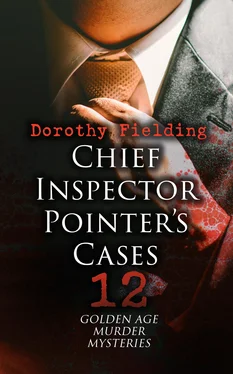The colonel sat silent, breathing fast.
"Your son, the Commissioner of Uganda, had a motor accident nearly three months ago now. That accident, coming on top of a bad head wound got in the war, brought on epileptic seizures. The Government, anxious to keep him if possible, sent him home secretly on sick leave, while he was given out as exploring around Tanganyika. I may say, that false report threw us off the track completely for a while. It was thought safer to leave you out of it, so Professor Charteris went to meet your son at Marseilles, putting his journey forward a couple of weeks. He travelled on with him to Genoa, where the commissioner was to undergo a sun cure at a helium establishment outside the town. He went there under his middle name of Sayce, and once, when an introduction was absolutely necessary, the professor introduced him by that name. The commissioner found that the sun cure, at Hotel Quisisana made him worse. He left suddenly on the Tuesday of the week in which his cousin was found dead. The doctors at Quisisana wired to a friend of yours in town, Sir Henry Carew, who was evidently in your confidence."
"All but at the end," the colonel said huskily.
"Sir Henry got the cable Wednesday, and sent the message down to you in a letter by his car. The Genoese doctors cabled—we had a copy, which is now destroyed—that they feared lest the young man who had left them before his cure had hardly begun, should develop homicidal tendencies."
The colonel nodded. He could not trust himself to speak of that awful cable even yet.
"He had told me that he didn't write to you. I talked with him yesterday in the nursing home, which he leaves to-morrow, as fit as ever. He says he felt too miserable to write to any one. I take it that you, here at home, were on the alert?"
"We took turns, Carew and I, watching for him at night. That was how I could play bridge on Thursday. Sir Henry was patrolling all the roads around Stillwater House till midnight. Then I took over. On the Wednesday we had reversed the hours."
"Yes, I thought that was about it." Pointer nodded to himself. "The commissioner got out at Barnet station on Thursday about ten; he was not recognised or noticed, and walked to Stillwater, hoping that the exercise would do him good. He must have got in unnoticed."
The colonel nodded. "If my son came across by Green Tree Farm, he would have been able to slip in through the orchard."
"He made for the summer house," Pointer went on, "and lay down in one of the bedrooms there, after finding that you were not in your study. There he fell asleep. What sound it was that woke him, he says he doesn't know, but it brought him up all standing, with a feeling that there was something wrong. And something wrong there was! It must have been his cousin's body that he heard striking the flags below his window."
The colonel drew in his breath with a hiss.
"He heard no cry," Pointer went on quickly, for the other was labouring under an almost intolerable strain, "but only the sound of steps running down from the top of the look-out."
"Thank God!" murmured the soldier, covering his face with his hands for a moment. "But then—however, that's for later. He heard no cry, you say? Thank God for that, too!"
"It was an instantaneous death, if ever there was one," Pointer assured him. "Your son opened his window, but the sky was overcast. He saw something rush past, below, bent double like a wild animal. And a wild, savage animal it was, true enough. He would have gone out to investigate, but just then came the sound of all your voices, as you went out after that shot."
"And I still don't understand that shot!" burst out Scarlett.
"Patience just a bit longer, sir. Being so ill, and weary after his walk, the commissioner lay down and fell asleep again at once. When he awoke the second time, it was half-past twelve. He remembered the steps running down the outside stairs, and the sudden rush past below. Curiosity, mingled with an odd sense of unease, he says, made him go out on to the flags. He stumbled headlong over Miss Charteris's body lying in a little pool of blood from the wound in her head where it had struck the edge of a flower-pot. That frightful shock brought on an attack. I confess when I think of some of the fancies those broken flower-pots gave rise to in my mind—"
Pointer shook his head. Then he went on, "You found him, colonel? How?"
"I heard him. Heard the noise he made. Don't ask me to describe the scene. I rushed into the dining-room for brandy. I wasn't sure that nothing could be done for Rose. That'll tell you how rattled I was! Mrs. Lane was awake and downstairs. She came to see if she could help. God bless that woman. I can't begin to tell what she was to me that night. It wasn't only what she did, but how she did it. She tried to bring Rose round, but by that time I had got my second wind. I knew a broken neck for what it was. Not only was Rose dead, but she had been dead a couple of hours or so when I found her—"
"What time?"
"Midnight almost exactly. I lifted Reggie into the summer house. He was unconscious, but I tied him up, in case he should come around before I had settled what to do."
"What did you tie him with?"
Scarlett had to think a moment.
"I went to my study for some rope I had there, but I had given it to the count. I had more of the same kind downstairs, however."
"Around some cases of Indian chutney?"
Scarlett nodded. He looked surprised.
"Then we put my poor niece's hat that we got from her bedroom on her head, as though she had been out, and added her sketching box. I cut away a strip of green paint on the back of her dress, and teased the place to make it look as though torn. Then," he gnawed his moustache for a moment, "then we rolled the poor girl up in my travelling rug, tied it top and bottom with the rest of the cord, lifted it on to a sort of carrier that happened to be standing on the flags, and Mrs. Lane put on Rose's shoes and walked down to the sand-pit behind me. Anything was better than having what we thought the truth suspected. Anything!"
"What dress did Mrs. Lane wear?"
"She had on a light dressing-gown when I saw her first. She changed it for something dark lying on the hall table—I don't know what, nor whose. She thought the stains wouldn't show on it. By the way, I wheeled Rose to the sand-pit. I suggested the place. Mrs. Lane did nothing but carry out my suggestions. Nothing whatever, Chief Inspector."
"Why did she take that fearful risk? I can see why you, sir, thinking your son had killed his cousin in a seizure, took it, but Mrs. Lane?"
The colonel did not reply for a moment. "Is this confidential?"
"About Mrs. Lane? Absolutely!"
"It will surprise you to learn that Mrs. Lane is really Mrs. Thornton. Her father was an old Eton chum of mine. She left Thornton for some woman's whim of his having married her for her money. I came on her later as a half-starved waitress in a bun-shop. Mrs. Lane is a proud woman. Thornton had been poor in those days and she rich. Now the position was reversed, she would have starved, or gone out altogether, rather than turn to him. But when I offered her the post of my lady-housekeeper she took it. I hoped it might bring them together again. For a time I thought it was no good, but I heard to-day from him that they're off for a year's cruise together next week. Mrs. Lane, to call her by her name in my house, has that rarest gift on earth—a grateful heart. She felt that she owed me something for giving her a post where she could keep in touch with her husband, and try to get him back. Not that I ever saw her try."
"I know," broke in Pointer, with his eye on the clock behind the other, "I thought that gratitude must be the key. Well, sir, you lifted the body on to the truck, and wheeled it to the sand-pit. Mrs. Lane walking behind, and helping to steer. You backed it under the trees of the copse, and carried the body down by the back shelving way, and left it in the pit?"
Читать дальше












